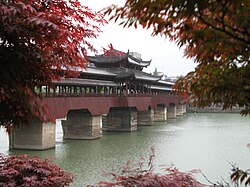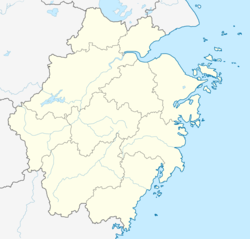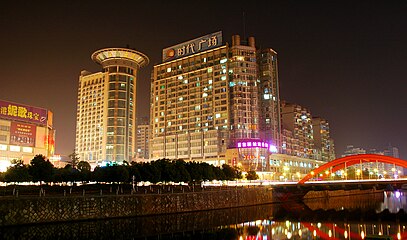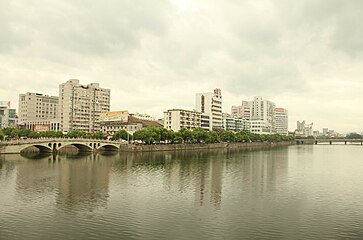Yongkang, Zhejiang
This article may require copy editing for grammar, style, cohesion, tone, or spelling. (September 2020) |
This article needs additional citations for verification. (September 2020) |
Yongkang
永康市 Yungkang | |
|---|---|
 | |
| Coordinates: 28°54′N 120°02′E / 28.900°N 120.033°E | |
| Country | People's Republic of China |
| Province | Zhejiang |
| Prefecture-level city | Jinhua |
| Area | |
• Total | 1,046.02 km2 (403.87 sq mi) |
| Population (2010 census[1]) | |
• Total | 723,490 |
| • Density | 690/km2 (1,800/sq mi) |
| Time zone | UTC+8 (China Standard) |
| Postal code | 321300 |
| Area code | 0579 |
| Website | http://www.yk.gov.cn/ |
Yongkang (Chinese: 永康; pinyin: Yǒngkāng), formerly known as Lizhou (Chinese: 丽州; pinyin: Lìzhōu), is a county-level city located in the central part of Zhejiang province, in the People's Republic of China. It is southeast of the Jinhua City boundary, approximately 180 km (111.8 mi) away from Hangzhou. It has an area of 1,049 km2 (405 sq mi) and a population of 536,000, including more than 100,000 non-resident workers. According to a 2010 census, it is a metro area, comprising Yongkang City and Wuyi County, was home to 1,073,389 inhabitants. Yongkang is considered the “hardware capital of China.”
History

The Chinese name Yongkang means "eternal well-being." The city was formally established during the period of the Wu Kingdom (222–280 CE) and the Three Kingdoms (220–280 CE) in 245 CE.[citation needed] In the last two decades, the city has become well known for both its aggressive promotion of tourism and its booming hardware manufacturing industry. It is widely considered the "Hardware Capital of China"[2], in addition to Shenzhen, with both cities receiving the title upon various occasions.[3][4] In 2003, Yongkang's GDP ranked 47th, out of over one thousand counties nationwide.[citation needed]
Lizhou was the ancient name of Yongkang. According to legend, when the mother of Sun Quan, the King of Wu was ill, she went on a pilgrimage to pray for "eternal well-being" at a temple in Lizhou. After she recovered, Sun Quan was very pleased and named the area Yongkang ("eternal well-being"), after her speedy recovery. At that time, it was a part of Wushang City; however, during the Tang dynasty, Yongkang was promoted under the name Lizhou, eventually becoming the general administrative area of the Yue Prefecture.
In 1992, the State Council approved of Yongkang as a county-level city.[5][citation needed]
Administrative divisions
Subdistricts:[6]
- Dongcheng Subdistrict (东城街道)
- Xicheng Subdistrict (西城街道)
- Jiangnan Subdistrict (江南街道)
Towns:
Economy
This section needs additional citations for verification. (October 2020) |
Since ancient times, Yongkang has been known for its hardware production. After 30 years of reform and modernization, Yongkang evolved from traditional to modern hardware, accelerating the pace of industrial upgrading and product branding. The county then became known domestically and abroad as a "hardware capital".
The city of Yongkang has always enjoyed the name "City of Metals". With metals and machinery as its flagship industry, other types of production in the city have grown consistently; these include the industries for electric tools, building materials, and automobile/motorcycle accessories. Additionally, the city is a national base for the production of electric tools, automobile/motorcycle accessories, anti-theft doors, electric bicycles, scooters, and thermal cups.
To prevent industrial theft from occurring, the Yongkang door industry, which has maintained its growth since 1997, has now become the eighth-largest Yongkang hardware industry; it is one of the largest and most stable industries in the world. In 2020, facing an unprecedented economic crisis, the industry still maintained strong growth momentum in the first half of the year, with a growth rate of 18%. Dominating Yongkang hardware products has become the calling card of the city, and beginning with the manufacture of metal gates, the industry now has 454 enterprise portal products. An industry-year output value of 100 billion yuan accounts for 70% of the national output of anti-theft doors. The reason for the Yongkang door industry's success is that from the early stage of development the industry places significant importance on their product's quality. The consensus among Yongkang door producers remains in a commitment to "establishing the brand, standards, and innovation". Yongkang produces four anti-theft doors every day, accounting for 1% of the national output of anti-theft doors.
52% of the national output of stainless steel tableware comes from Yongkang. 45% of the national output of the daily-use weighing apparatus comes from Yongkang. A third of the national output of power tools comes from Yongkang. Packaging drums, building non-slip case scales, the degree of scales, and other products accounted for more than 90% of the domestic market. Scooters, gas stove burners accounted for 90% of the total exports. Pumps accounted for 50% of the total exports. Saw blades accounted for 1/3 of the total exports. Weighing manufacturing enterprises accounted for 35/235 of the national output.
Every day, one new private enterprise is founded in Yongkang.
Yongkang is named the "Cradle for the elderly", the "face", the "Cup of joe", the "Door store of America”, and the "Recreational toilet of Brittany".[citation needed]
Cityscape
-
Yongkang at night (2008)
-
Confluence of Hua Brook (华溪) on the left and Nan Brook (南溪) on the right, forming the Yongkang River (永康江) in the middle (2010)
See also
- Xijin Bridge, a famous covered bridge in China
References
- ^ "China: Zhèjiāng (Prefectures, Cities, Districts and Counties) - Population Statistics, Charts and Map". www.citypopulation.de. Retrieved 21 April 2018.
- ^ "China's 'hardware capital' grinds to a halt amid coronavirus fears". Retrieved 25 September 2020.
- ^ "SHENZHEN: HARDWARE CAPITAL OF THE WORLD". Retrieved 25 September 2020.
- ^ "Made in Shenzhen: The Silicon Valley of Hardware". Retrieved 25 September 2020.
- ^ county
- ^ "金华市-行政区划网 www.xzqh.org" (in Chinese). XZQH. Retrieved 24 May 2012.



